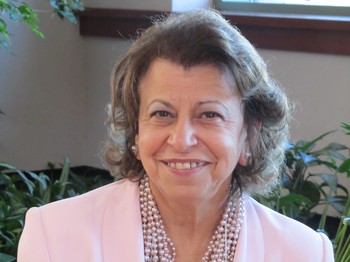Fifteen international peacemakers from different countries around the world are visiting congregations, presbyteries and colleges of the Presbyterian Church (U.S.A.) from Sept. 21-Oct. 15.
They are sharing their stories about church-based ministries in their countries that seek peace justice and pursue peace in the name of Jesus Christ. This year’s international peacemakers come from Colombia, Honduras, Indonesia, Jordan, Lebanon, Madagascar, Northern Ireland, Palestine, the Philippines, Russia and Syria.
The International Peacemaker program is sponsored by the Presbyterian Peacemaking Program.
Nora Kort, a Palestinian Christian born and raised in Jerusalem, is a community development consultant and a social and woman’s activist. She also founded the WUJOUD Museum of Collective Memory in the Old City of Jerusalem.
Kort is one of the authors of the Kairos Palestine Document, in which Palestinian Christian leaders declare the Israeli occupation of Palestine is a sin against God and humanity. The document encourages Palestinian Christians to maintain hope and challenges churches around the world to stand in solidarity with the people of Palestine.
She will be speaking at Lyon College, a Presbyterian-related institution in Batesville, Ark., and in Muskingum Valley Presbytery.
What is the situation in your country that you will be addressing?
“I will be giving an overview of the situation in the country from a political and economic standpoint and talking about the hopes and aspirations of the people. The situation at the moment is desperate. People are very frustrated with the protracted lack of true peace and justice in our part of the world. Because of the economy, many people are opting to leave the country, especially the younger generation.”
How are the faith communities addressing this situation?
“The younger generation started to ask: “What is our role? What can we do as Christians?” That’s why we came up with the Kairos Document, which expresses our belief in faith, love and hope.”
What lessons from your situation are you trying to communicate to U.S. Presbyterians?
“The lessons learned are that we have to respect and honor our duties, but at the same time we have to get our full rights as human beings. So any violation of human rights should be criticized. The violations have to stop.”
What is the primary message you want to communicate to U.S. Presbyterians?
“I don’t want them to see the problems just through my own eyes. I don’t want them to only hear about the problems, but I want them to come, visit, see and learn for themselves and to stand in solidarity with me and with my people.”
Pat Cole is a communications specialist with the Presbyterian Mission Agency and an occasional contributor to Presbyterian News Service.

